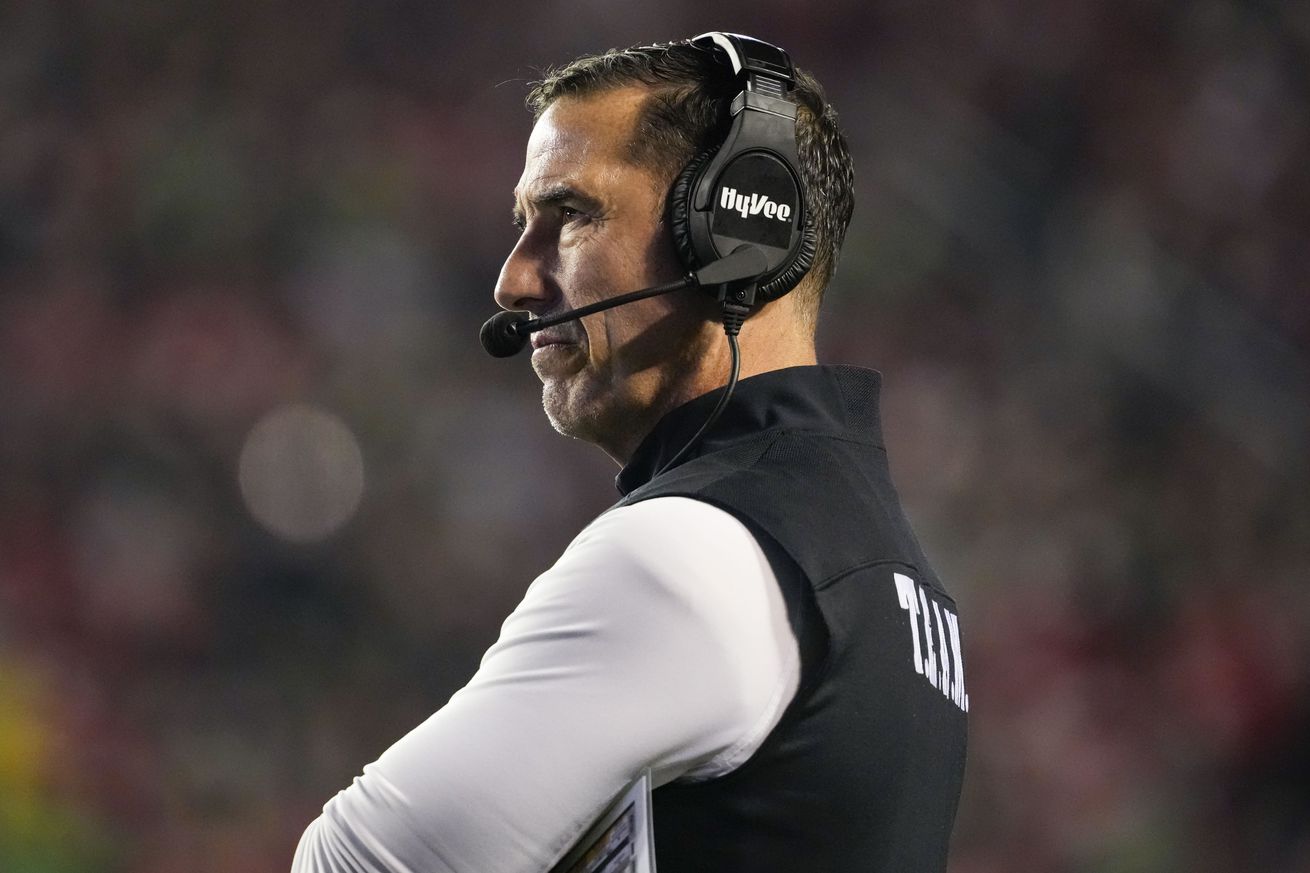
The Badgers head coach had an interesting take on the team’s next playcaller.
The Wisconsin Badgers made a big move this weekend, firing offensive coordinator Phil Longo one day after their 16-13 loss to the No. 1 Oregon Ducks, marking the most significant change that head coach Luke Fickell has made in his tenure thus far.
With Longo fired, the expectation is that tight ends coach Nate Letton will call plays this Saturday when the Badgers play the Nebraska Cornhuskers, while wide receivers coach Kenny Guiton will aid in the collaborative effort by signaling in the plays.
Fickell addressed the firing on Monday during his weekly press conference, and appeared frustrated at the line of questioning from reporters, who mainly focused on his choice to fire Longo and the impact it has on the team with two games to go.
One of the biggest questions was who Wisconsin’s interim play-caller would be, to which Fickell elected not to answer.
“Why does it matter? I mean, the offense will be run and those guys will do a lot of things collaboratively together,” Fickell said about the team’s next play-caller. “And I don’t think it really is important as to who’s calling it.
“I guess it gives you the ability to point a finger at somebody if that’s the case, but it’s not one of those things, I think, is that important. Sometimes, I think it’s overrated in some ways, but it’ll be a collaborative group and those guys will have to work a lot together.”
One of the biggest questions around Longo’s firing was the timing of the move, as the Badgers did so while still searching for a bowl game with two games remaining in the season.
In firing Longo and turning to the remainder of the staff, the Badgers will have no coaches with collegiate play-calling experience on the offensive side on the sidelines Saturday. But, Fickell downplayed the importance of that area as well.
“There’s a bunch of guys that have play-calling experience. I’m sure I got some play-calling experience. I did the offensive [play-calling for] fifth grade, seventh grade [football] right out of college there for a little while,” Fickell continued. “Sometimes I think we do get it overblown, like, ‘well, who’s the guy calling?’ Look, I don’t want to get into this, but I called it for a lot of years as a defensive guy at Ohio State when nobody really knew who was calling the play, who was calling the defense. Well, I don’t know. Does it matter?”
I mean, we had a bunch of co-coordinators, we had so to speak, [so] we didn’t get involved in [who the play-caller was]. Every time I was asked at a press conference, ‘Hey, by the way, who calls the defense?’ Why does that matter? So that you have somebody to, you know, kind of point at. And I knew deep down I knew who was calling it. And I’ve always kind of had that philosophy, so I don’t know that it matters.”
However, later on, when asked about looking for the team’s next offensive coordinator, Fickell acknowledged that the complementary ball was not as good as the team wanted, while saying that it was more about an individual, referencing the coaching change.
“I think maybe that was one of those issues that it was not as good as where we wanted it offensively, that it was more about an individual,” Fickell said. “Like that’s what the program is. It’s complimentary ball. It’s so much everybody rely upon each other that any one person shouldn’t matter all that much. And I know that [it’s] hard to say, ‘well, they’re the coordinator’ and they’re like, I hope that it wouldn’t be that much different if somebody else was calling the plays on offense or on defense.”
“That’s my vision for what I want the program to grow. There’s things you want to grow as in your locker room. There’s things you want to grow on your football field. There’s things I want to grow in the coaching staff and to me that everybody believes and is going in the same direction, that if you had the opportunity to call, maybe it’ll be a little bit different. If somebody else had the chance to call the defense, well, maybe in certain situations they’d call something a little bit different, maybe they’d blitz a little bit more. But the general idea is we’re all doing the same things, believing in the same things, and it shouldn’t matter quite as much if we prepare and do the things we need to do about who’s actually making and has the final say.”
It’s clear that in not naming the next coordinator, Fickell is looking to protect his staff, who have been put into an unfortunate situation out of their comfort zone.
But, the play-calling aspect was certainly important, as the disconnect between Fickell and Longo seemed to be in part due to the vision for the offense. There’s a reason that Longo was well-heralded coming into Madison and could demand the highest salary of any assistant on the team.
Now, it’s on Fickell to evaluate what went wrong with this move and how he can fix it with a better hire the next time around.
